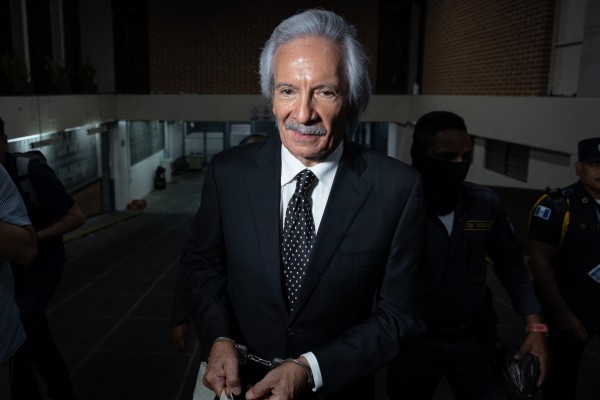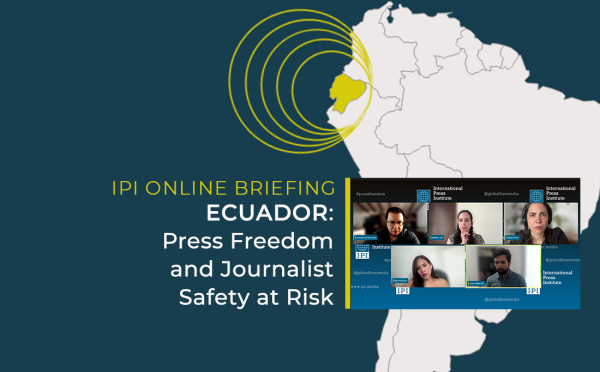The upcoming presidential elections on October 7th could mark a pivotal moment in the contemporary history of Venezuela. The prelude to this event has been marked by a dangerous series of conflicts between supporters and opponents of the current regime, whose consequences often limit the right to inform and be informed.
The year 2012 began by dragging behind it a convulsive 2011, in which, according to figures of the Press and Society Institute of Venezuela (IPYS, according to its Spanish acronym), 200 cases of freedom of speech violations were recorded. Instances of censorship, initiated by judicial rulings that prohibited the publishing of certain information, accounted for 50% of cases, while cyber attacks represented 27%. The Inter-American Commission on Human Rights (IACHR) described 2011 as one of the worst years for the Venezuelan press.
So far in 2012 IPYS has recorded 64 press-freedom violations. The most affected region in Venezuela is the state of Barinas, birthplace of President Hugo Chávez Frías, nowadays ruled by his own brother, Adán Chávez. Thus far, there have been 10 reports of violations against the free exercise of the press, amongst them death threats against journalists, raids on residences, the closure of radio and television broadcasts, judicial processes and assaults. In response to this situation, the National Association of Journalists (NAJ) in Barinas issued a statement on May 24th formally accusing Adam Chávez and his closest collaborators of committing “aggravated and repeated violations against free expression.” The general secretary of the NAJ Journalists pointed out 57 freedom of expression and press freedom violations in Barinas since 2008.
The International Press Institute (IPI) is concerned that in 2012 we may already be witnessing a serious decline in press freedom due to the attempts of different groups in power to avoid a critical and independent press. Assaults against journalists and the media are occurring with heightened frequency, and it would appear that censorship is also on the rise – when it comes to topics viewed as sensitive by the government, not only are there limits on access to information, but informants are also being persecuted.
According to some experts, this scenario is partly triggered by the violent language used by President Chávez in speeches against critical and independent sectors, amongst them, the media. In Venezuela, physical, psychological and cybernetic violence, as well as intimidation by legal means, against journalists are all strongly present and there is also an environment of fear, self-censorship and impunity. Between January and May 2012 intimidation by legal means was the most frequent of these, with more than 16 cases reported, according to IPYS reports.
The news channel, Globovisión, has had a lawsuit pending against it since October 2011 for covering a mutiny that took place in the El Rodeo penitentiary in the state of Miranda, which claimed the lives of 30 people. The channel was formally accused of inciting crimes, promoting unrest, hatred and intolerance and fined more than 2 million dollars for its coverage, which was seen as being in defense of the mutiny.
Something similar occurred after coverage of conflicts between prisoners and the National Guard that took place in the La Planta prison. Government officials gave orders to seize work equipment of the media and to set a press blockade in the area surrounding where event took place. With respect to the coverage, Minister of Penitentiary Services Iris Varela told Venezolana de Televisión (Venezuelan state television) that the private news channel Globovisión was divulging “malicious information” and that, as a consequence, “a warrant was issued to seize the station equipment and the interruption of the channel broadcast” the National Association of Journalists reported.
On May 17th, the main Venezuelan communications company, CANTV, blocked the news portal “Lapatilla.com” for 24 hours, for allegedly providing “inappropriate” information about the events that took place at La Planta prison. From the offices of Lapatilla.com an email was sent reporting the block from the provider and alleging violations of free press and entrepreneurial freedom.
Another example of these attempts to silence the press was the detention of two Cadena Capriles reporters by the army on February 14th, near the Guarapiche river in the state of Monagas. The reporters had made a tour around the area where an oil spill had occurred. A month later there were reports of contaminated water in different parts of the country and on March 20th the president accused the press of media terrorism for reporting on the subject. He also affirmed that these news broadcasts were an attempt to harm his image in an electoral year. “We cannot remain inactive during these campaigns. This is terrorism and it will not be tolerated”, stated the president, according to local media. The next day, Attorney General Luisa Ortega Díaz announced that she would request the courts to order the media to publish a report that proved the published information about the water contamination
“Reporting about the conflicts in Venezuelan penitentiaries has become a crime. There is a strong wish to punish the media and direct intimidation is being used over and over again against reporters in order to avoid having these problems published. Water contamination was another sensitive subject for the government: journalists were detained and legal measures were used to avoid the stories. Problems related to similarly sensitive subjects will continue to arise in the months prior to the elections and it is paramount that people know about them” said IPI press freedom manager Barbara Trionfi.
“We request the Venezuelan government to respect the work of journalists and guarantee their safety. Public officials should not be the primary aggressors against the media, whether through their use of language, or through administrative sanctions and limitations on access to information. This is a decision-making year for Venezuelans, and every citizen should be informed about the reality of their surroundings and, for this reason, journalists form more than ever the basis of democracy”, added Trionfi.
During the governance of President Chávez, on May 27th 2007, the oldest channel in the country, RCTV, stopped broadcasting after the government denied the renewal of its broadcasting license. Later, on July 31st, 2009, 34 radio stations left the dial. The closing of television channels and radio stations continues to occur. On March 30th, the Venezuelan National Telecommunications Commission (CONATEL, according to its Spanish acronym) closed four radio stations and seized their transmitting equipment in the state of Monagas, due to operating “without the proper administrative license”. One of the stations, Caicareña 100.5 FM, owned by José Gregorio Briceño, the brother of the state governor, was raided by the anti-riot task force of the National Guard, in a violent act that left many wounded, the newspaper El Universal reported. CONATEL answered the accusations by affirming that four of its own employees were assaulted by a gang led by the governor’s brother.
It is not only President Chávez who has used language of hate towards the opposition. In the state channel Venezolana de Televisión (VTV), the hosts of many opinion programs imitate the president’s vocabulary. An important example in the last months was the verbal attacks of Mario Silva, host of the program “La Hojilla” (“The Razorblade”), who on March 14th verbally attacked the graphic artist of El Universal, Rayma Suprani, for what he called the spreading of “racist and class-based hate.”
Also in VTV, the news anchor Miguel Pirela announced that a “group of experts” discovered a concealed message in the answers of the crossword puzzle in Últimas Noticias, designed by the writer Neptalí Segovia and published on May 9th. According to Pirela, the concealed messages in the crossword puzzle call for a possible murder attempt on the brother of the president, Adán Chávez. The answers formed the words “Adán,” “blasts” and “kill,” reported the news site “Inquisitr”. After the anchor’s comments, Segovia was questioned by the Venezuelan police on May 11th, according to The Huffington Post. Segovia, who has written crosswords in the newspaper for 17 years affirmed that the crosswords have nothing to do with politics, reported The New York Times. Segovia blamed this situation on people who try to create controversy during the presidential campaign.
Due to the closing of different ways of reporting about the government, the Internet has become for many the ideal place to share their analysis about the country. Perhaps for this reason the numbers of cyber-attacks has risen, as IPI previously reported
On May 28th, two grenades were thrown into the facilities of a newspaper in the state of Zulia called “¿Que pasa?” Its director, Pedro Pablo Guisandes, interpreted the violent event as a response to “an editorial line of investigative and front-line journalism” that made high authorities in the government uncomfortable.
The private media is not the only victim of verbal and physical assault. There are reports of physical and verbal assaults against state journalists. On May 29th, for example, the facade of the headquarters of the state channel Zulia Catatumbo TV was hit by 14 bullets. Its director, David Pernia, assured that the attack was an act of retaliation against the channel for complaints made against the presidential candidate Henrique Capriles Radonski. Although the person behind the attack remains unknown, Pernia believes that the attackers were attempting to intimidate him. His leading hypothesis is that the aggression was “an answer to the broadcast of reports about the presidential candidate (of the opposition) who allegedly threw away a group of letters that were given to him by citizens of the state”, the newspaper TalCual reported.
In a similar way, some state journalists have complained about the difficulties covering the electoral campaign of Capriles. On May 10th, when Capriles Radonsky toured the town of Pedraza, in Barinas, the VTV reporting team denounced an attack against them by members of the Coalition for Democratic Unity (Spanish: Mesa de la Unidad Democrática), an umbrella group of opposition parties. According to statements by journalist Janeth Suárez and cameramen Dani Vargas, “two bodyguards (of Capriles) threw Vargas`s camera to the street while Suárez was stalked and chased”. The incident was condemned by Tarquino González Concho, general secretary of the National Journalist Association of Barinas.
“The Minister of Communication has already issued statements about the recent aggressions against state media reporters, but has not expressed anything regarding the other press-freedom violations. We urge the authorities to respect and defend all journalists” insisted Mills.
As the Venezuelan electoral season unfolds, the competing political sectors are increasing, in one way or another, their attacks and aggression against journalists of all stripes – state, independent, or opposition. This situation makes balanced and fair coverage difficult and, without a doubt, affects Venezuelan citizens, for whom these journalists and media outlets work.
Translated by Jorge Rodríguez


